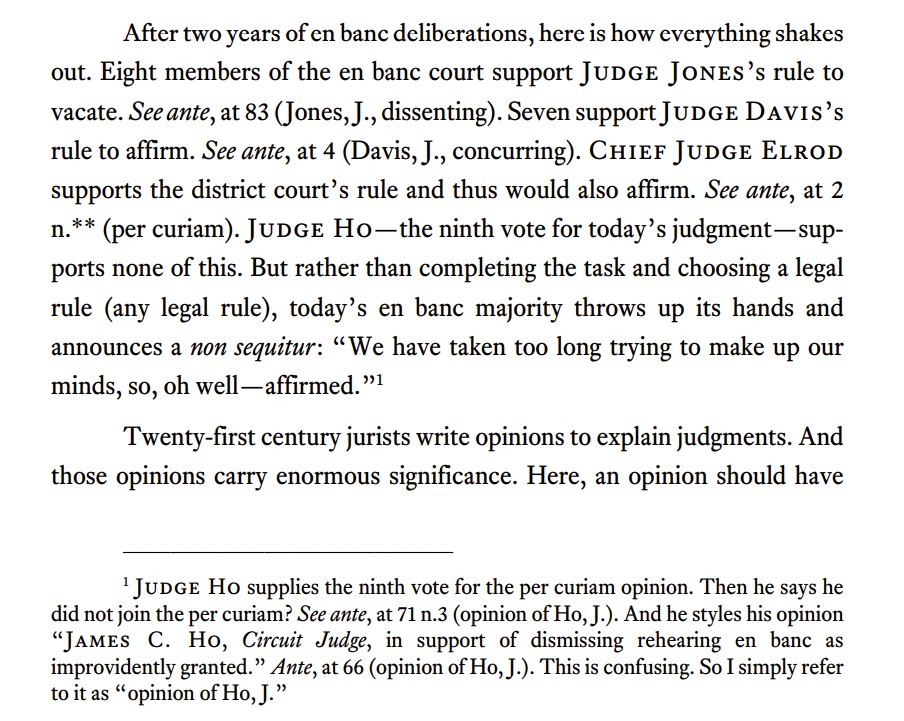Monthly Archives: December 2024
 In Alliance for Fair Board Recruitment v. SEC, the en banc Fifth Circuit held that the SEC should not have approved Nasdaq’s “Board Diversity Proposal.”
In Alliance for Fair Board Recruitment v. SEC, the en banc Fifth Circuit held that the SEC should not have approved Nasdaq’s “Board Diversity Proposal.”
The Court reminded that the Act is focused on protecting investors from speculative, manipulative, and fraudulent practices, and promoting competition in the securities market; therefore: “SEC may not approve even an a disclosure rule unless it can establish the rule has some connection to an actual, enumerated purpose of the Act.” It rejected the SEC’s argument that the proposal would satisfy investor demand for diversity information, holding: “The purpose of satisfying investor demand for any and every kind of information about exchange-listed companies is not remotely similar to any of those stated purposes.”
Cf. McCullough v. Maryland,17 U.S. 316 (1819) (“Among the enumerated powers, we do not find that of establishing a bank or creating a corporation. But there is no phrase in the instrument which, like the articles of confederation, excludes incidental or implied powers; and which requires that everything granted shall be expressly and minutely described.”).
The Court also found support for its holding in the major questions doctrine, given the expansive regulatory authority that it concluded would be needed for the SEC to implement the proposal. A dissent argued that the SEC had received substantial evidence that investors sought standardized information on board diversity, and noted the SEC’s limited statutory authority to review the rules of Nasdaq, a distinct and private entity (albeit one that is heavily regulated). No. 21-60626, Dec. 11, 2024 (9-8 vote).
 Judge Oldham’s thoughtful dissent from the recent wreckage of an en banc proceeding provides fascinating historical background about courts’ traditional focus on decisions rather than opinions. That basic concept about the operation of appellate courts is useful in distinguishing holding from dicta, identifying the appropriate scope of appellate review, and clarifying questions about the law of the case / res judiciata effect of earlier judgments.
Judge Oldham’s thoughtful dissent from the recent wreckage of an en banc proceeding provides fascinating historical background about courts’ traditional focus on decisions rather than opinions. That basic concept about the operation of appellate courts is useful in distinguishing holding from dicta, identifying the appropriate scope of appellate review, and clarifying questions about the law of the case / res judiciata effect of earlier judgments.
By including Roman courts in its historical review, the opinion reminds how much the American system has borrowed from the civilian tradition – a point of particular interest in Texas, where opinions from the 1840s by the Republic of Texas Supreme Court vividly illustrate the jostling between the English/American and Spanish/French systems on issues of property law at that time.
 Lengthy en banc deliberation produced a one-paragraph, per curiam affirmance in Environment Texas Citizen Lobby, Inc. v. ExxonMobil Corp., a long-running challenge to a $20 million environmental fine. Judge Oldham’s dissent summarizes the bewildering array of votes and opinions:
Lengthy en banc deliberation produced a one-paragraph, per curiam affirmance in Environment Texas Citizen Lobby, Inc. v. ExxonMobil Corp., a long-running challenge to a $20 million environmental fine. Judge Oldham’s dissent summarizes the bewildering array of votes and opinions:
 The case of Chaudhary Law Firm, P.C. v. Ali reminds: “It is more than well-settled that only an aggrieved party may appeal a judgment.” A party is not considered “aggrieved” if they have received a favorable judgment, even if the trial court made subsidiary findings or conclusions that were unfavorable to them.
The case of Chaudhary Law Firm, P.C. v. Ali reminds: “It is more than well-settled that only an aggrieved party may appeal a judgment.” A party is not considered “aggrieved” if they have received a favorable judgment, even if the trial court made subsidiary findings or conclusions that were unfavorable to them.
The Court emphasized that “appellate courts review judgments, not opinions,” and a winning party “may not appeal for the sole purpose of seeking a more favorable opinion from the [trial] court.” The Court noted some situations that could warrant a relaxation of this principle, none of which were present in this case, where the defendant law firm obtained complete dismissal on the merits. No. 23-20362 (Dec. 9, 2024).
Savoie v. Pritchard affirmed that there is “life within” the fiduciary shield doctrine in Louisiana law. The doctrine prevents the exercise of personal jurisdiction over a corporate officer based solely on their corporate acts, and is “rooted in the principle that the acts of a corporate officer in his corporate capacity cannot form the basis for jurisdiction over him in an individual capacity.” In this Erie case, the Fifth Circuit found implicit recognition of the doctrine in a Louisiana Supreme Court case.
affirmed that there is “life within” the fiduciary shield doctrine in Louisiana law. The doctrine prevents the exercise of personal jurisdiction over a corporate officer based solely on their corporate acts, and is “rooted in the principle that the acts of a corporate officer in his corporate capacity cannot form the basis for jurisdiction over him in an individual capacity.” In this Erie case, the Fifth Circuit found implicit recognition of the doctrine in a Louisiana Supreme Court case.
The Court emphasized that “contacts made in [the defendant’s] corporate capacity do not count against him for purposes of personal jurisdiction unless one of two exceptions apply: (1) the defendant allegedly engaged in a tort for which he may be personally liable, or (2) the plaintiff demonstrates cause to pierce the corporate veil.” No such claim was pleaded here or shown here, so the fiduciary shield doctrine barred personal jurisdiction over the defendant. No. 23-30783, Nov. 25, 2024.
This week, the Eastern District of Texas enjoined a sweeping set of Treasury regulations about disclosure of beneficial ownership, concluding that the Corporate Transparency Act and related regulations exceeded Congress’s constitutional powers. The Northern District of Texas rejected Boeing’s plea bargain of charges related to the 737 MAX debacle, concluding that inappropriately required consideration of race in selecting the monitors for a program that would administer Boeing’s compliance with agreed obligations going forward. The Boeing ruling may yet be resolved in the trial court, as the judge asked the parties to report back in 30 days, but the CTA case will certainly be headed to the Fifth Circuit soon.
 In Van Loon v. Dep’t of the Treasury, the Fifth Circuit addressed the Treasury Department’s authority to regulate “property” under the International Emergency Economic Powers Act. After a detailed explanation of the blockchain technology involved, the Court held that certain “immutable smart contracts” do not qualify as “property” under IEEPA. The Court emphasized that “property” must be capable of being owned, and since the immutable smart contracts are unchangeable and unremovable, they cannot be owned or controlled by any entity, including their creators.
In Van Loon v. Dep’t of the Treasury, the Fifth Circuit addressed the Treasury Department’s authority to regulate “property” under the International Emergency Economic Powers Act. After a detailed explanation of the blockchain technology involved, the Court held that certain “immutable smart contracts” do not qualify as “property” under IEEPA. The Court emphasized that “property” must be capable of being owned, and since the immutable smart contracts are unchangeable and unremovable, they cannot be owned or controlled by any entity, including their creators.
The Court further clarified that even under the Treasury’s own regulatory definitions, the immutable smart contracts do not fit within the scope of “property.” The court noted that these smart contracts are neither contracts nor services, as they do not involve any human effort or control once they are deployed. No. 23-50669 (Nov. 26, 2024).
In Willis v. Barry Graham Oil Service, L.L.C., the Fifth Circuit read the relevant contract provisions differently than the district court.
The district court concluded that Barry Graham Oil Service did not fall within the defense, indemnification, and insurance provisions of the Master Services Contract (MSC) between Shamrock Management and Fieldwood Energy. Specifically, it found that Graham was not covered by the MSC’s indemnity provisions because it was not part of the “Third Party Contractor Group” defined in the contract.
The Fifth Circuit held that Graham was covered under the MSC’s indemnity provisions. The MSC required Shamrock to “release, indemnify, protect, defend, and hold harmless such other Third Party Contractor(s) (and any such Third Party Contractor Group),” from claims arising from injuries to Shamrock’s employees.
Therefore, Graham, as part of Kilgore Marine Services’ Third Party Contractor Group, was entitled to indemnification. The contractual trigger for these obligations—cross indemnification “substantially similar” to Shamrock’s—was satisfied, obligating Shamrock to defend and indemnify Graham. No. 23-30609, Nov. 20, 2024.
 In State of Texas v. U.S. Dep’t of Homeland Security, the Fifth Circuit addressed a challenge by Texas to a federal plan to cut razor wire installed by Texas at a border crossing. A 2-1 opinion ordered entry of a preliminary injunction against the planned wire-cutting.
In State of Texas v. U.S. Dep’t of Homeland Security, the Fifth Circuit addressed a challenge by Texas to a federal plan to cut razor wire installed by Texas at a border crossing. A 2-1 opinion ordered entry of a preliminary injunction against the planned wire-cutting.
The panel majority held the Administrative Procedure Act “clearly waives the United States’ sovereign immunity for Texas’s common law claims,” allowing Texas to seek injunctive relief against federal agencies and officers. In particular, Texas’s claims sought non-monetary relief and were based on the destruction of its property, which falls under the definition of “agency action” in the APA.
The majority also held that Texas showed a strong likelihood of success on its state law trespass-to-chattels claim–the concertina wire is state property, and Texas had shown that the federal agents’ actions were not justified by any exigency or statutory authority. As a result, the court granted Texas’s request for a preliminary injunction, enjoining federal agents from damaging or interfering with Texas’s concertina wire fence.
A dissent argued that Texas did not show the alleged “wire-cutting policy” constituted final agency action, which is a prerequisite for judicial review under the Administrative Procedure Act (APA). It also concluded that Texas’s state law claims were barred by intergovernmental immunity, as applying Texas tort law to federal agents would improperly control federal operations. No. 23-50869 (Nov. 27, 2024).

